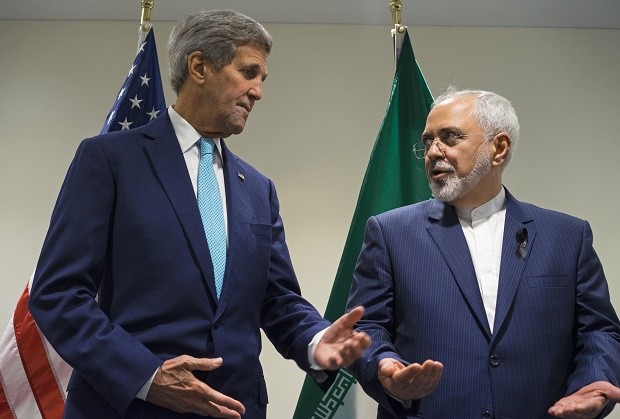US, Iran forge new relationship as nuke deal advances

In this Sept. 26, 2015 file photo, Secretary of State John Kerry meets with Iranian Foreign Minister Mohammad Javad Zarif at United Nations headquarters. As Iran races to satisfy the terms of last summer’s nuclear deal and the US prepares to suspend sanctions on Tehran as early as Friday, Kerry is talking to Zarif more than any other foreign leader, including an emergency call Tuesday to secure the release of 10 US sailors after they were detained by Iran in the Persian Gulf. AP FILE PHOTO
WASHINGTON — For diplomats from countries without diplomatic relations, Secretary of State John Kerry and Iranian Foreign Minister Mohammad Javad Zarif sure are doing a lot of diplomacy.
As Iran races to satisfy the terms of last summer’s nuclear deal and the US prepares to suspend sanctions on Tehran as early as Friday, Kerry is talking to Zarif more than any other foreign leader. Those talks included several emergency calls Tuesday to secure the release of 10 US sailors after Iran detained them in the Persian Gulf.
Since the beginning of the year, Kerry and Zarif have spoken by phone at least 11 times, according to the State Department. They’ve focused on nuclear matters, Iran’s worsening rivalry with Saudi Arabia and peace efforts in Syria.
By contrast, America’s top diplomat has talked to Saudi Foreign Minister Adel al-Jubeir only twice. He has consulted once each with Saudi Deputy Crown Prince Mohammed bin Salman, Jordan’s King Abdullah and the foreign ministers of Britain, Egypt, France, Germany, Russia and the European Union.
Kerry is departing Wednesday evening to meet al-Jubeir in London. He may extend the trip to see Zarif, too, elsewhere in Europe.
Article continues after this advertisementNot everyone is happy with the new friendship between the once hostile foes. But the White House, Pentagon, Kerry and Zarif are all crediting the relationship forged over two-and-a-half years of nuclear negotiations with quickly resolving the detention of the sailors, which could have been a new crisis just as President Barack Obama delivered his final State of the Union speech to Congress.
Article continues after this advertisementREAD: Iran takes 10 US sailors into custody in Persian Gulf
“We can all imagine how a similar situation might have played out three or four years ago, and the fact that today this kind of issue can be resolved peacefully and efficiently is a testament to the critical role diplomacy plays in keeping our country safe, secure and strong,” Kerry said Wednesday.
Denis McDonough, the White House chief of staff, said the open lines between Kerry and Zarif are “extraordinarily important.” Defense Secretary Ash Carter thanked Kerry for his efforts. And in Tehran, Zarif tweeted that he was “happy to see dialogue and respect, not threats and impetuousness, swiftly resolved the sailors episode. Let’s learn from this latest example.”
For the Obama administration, the budding Kerry-Zarif relationship offers opportunities and pitfalls. As negotiations with Tehran accelerated in 2013, US officials insisted the diplomacy concerned only ending the threat of a nuclear-armed Iran and shouldn’t signal a strategic realignment that would forsake longstanding US allies like Israel or the Gulf state Sunni monarchies.
As the deal came together last July, Obama and his top aides vowed to “double down” on Iran’s activities like its support for Syrian leader Bashar Assad’s government and anti-Israel and anti-US groups like Hamas and Hezbollah.
READ: US preparing new sanctions against Iran — report
The record, however, has been mixed.
The US has modestly expanded sanctions on Hezbollah, but hasn’t followed through on pledges to impose penalties after a recent ballistic missile test by Iran that violated a UN Security Council ban. Washington also offered no response to an Iranian navy rocket fired near a US warship in the Strait of Hormuz.
At the same time, the US has expanded outreach efforts to Iran. The Obama administration included the Iranians for the first time in international mediation efforts to secure a cease-fire between Assad’s government and rebel groups.
Echoing Saudi and Israeli concerns, Republican lawmakers say they’re unsettled by the warming ties. They say the nuclear deal that they opposed is preventing Obama from dealing assertively with Iran, because he is more concerned with protecting his signature foreign policy achievement.
Conscious of these perceptions, the administration moved warily into the Saudi-Iran spat that erupted over New Year’s weekend. The US did not want to play mediator between a longtime ally in Riyadh and a government that, at least officially, remains hostile to the United States some three-and-a-half decades after the 1979 Islamic Revolution and US Embassy hostage crisis.
But the US has a lot at stake in calming tensions. Saudi Arabia and Iran already are backing opposing sides in Syria and refusing to cooperate against the Islamic State. They’re trading accusations over the war in Yemen, where a Saudi-led intervention hasn’t uprooted the Iran-backed Houthi rebels.